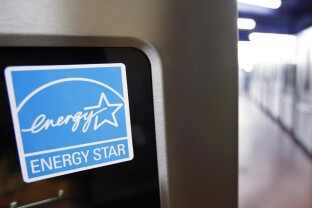Bosch and other home appliance makers are vocally pushing back on the Trump administration’s reported plans to eliminate the popular Energy Star labeling program — an unusual break from the placation most companies have embraced in the first few months of Trump’s term.
The companies urged the administration to preserve the program, which certifies appliances as meeting high efficiency standards, after CNN first reported on Tuesday that the Environmental Protection Agency planned to eliminate the Energy Star program as part of a massive restructuring.
They argued that ending Energy Star labeling would go against Trump’s stated goal of bringing down energy prices. The labels were designed as an easy way for consumers to spot energy-efficient appliances, which can lead to major savings.
“Eliminating it will not serve the American people,” a coalition of industry leaders wrote in a letter to the EPA reviewed by NOTUS. Along with Bosch, the list includes HVAC and boiler companies like Copeland and Cleaver Brooks as well as the Association of Home Appliance Manufacturers and the National Electrical Manufacturers Association.
The EPA has not confirmed the report that it plans to end Energy Star, which was created in 1992. “On Friday, EPA announced the next phase of organizational improvements to the agency to better provide clean air, water, and land for all Americans,” an agency spokesperson said in a statement. “These workforce changes impact the Office of the Administrator, Office of Air and Radiation, Office of Chemical Safety and Pollution Prevention (OCSPP), and Office of Water.”
Industry associations and especially individual companies have largely hesitated to publicly condemn the Trump administration’s policies, making this immediate and vocal pushback a notable departure from the norm.
The Trump administration has pledged to lower electricity costs for everyday Americans — something that Energy Star, a voluntary partnership between the private sector and the EPA, is credited with achieving at little cost.
The EPA estimates that Energy Star has saved more than $500 billion in energy costs for businesses and consumers since 1992, and that the average household can save about $450 per year on their electricity bills by choosing labeled appliances.
“Because the Energy Star brand is highly recognizable to consumers, it is likely that, should the program be eliminated, it will be supplanted by initiatives that drive results counter to the goals of this administration such as decreased features, functionality, performance, or increased costs,” industry officials wrote in the letter.
The program is so popular that appliance companies and trade associations, including General Electric and the American Gas Association, have historically lobbied for the program to be preserved every time there is a proposed challenge to its budget or its function. Trump proposed eliminating the program in a 2017 budget and drew immediate widespread industry condemnation at the time.
“If you wanted to raise families’ energy bills, getting rid of the Energy Star label would be a pretty good way,” Steven Nadel, the executive director of the American Council for an Energy-Efficient Economy, said in a statement. “This would take away basic information from consumers who want to choose cost-saving products easily. There’s a reason this program has been so popular with consumers and manufacturers alike.”
—
Anna Kramer is a reporter at NOTUS.
Sign in
Log into your free account with your email. Don’t have one?
Check your email for a one-time code.
We sent a 4-digit code to . Enter the pin to confirm your account.
New code will be available in 1:00
Let’s try this again.
We encountered an error with the passcode sent to . Please reenter your email.


